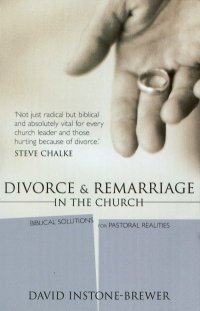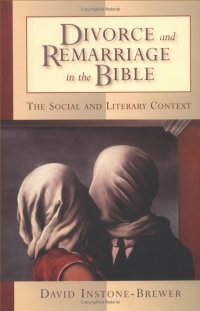

|
Questions & Replies about
Divorce and Remarriage | ||

|
Pastoral support doesn't really work by email, so if you need this, I'd encourage you to find a local fellow Christian or minister. Their personal views on this subject don't matter too much if they are good at listening, both to you and to God. David Instone-Brewer |

|
| Emailed question/comment: | ||
|
I've just got divorced and I want to know where I stand. Can you give me a quick summary of what you have found out? |
||
Reply: | ||
|
Normally I would say: Come back when you have read the book! – but I will make reply accessible to everyone, so no-one else will need to ask this question: - First of all, I have found that you are in good company, because God is a divorcee, and the Church, the holy bride of Christ, is marrying a divorcee. God's marriage to Israel, whom he had to divorce because of her adultery, was not regarded as just a metaphor by the prophets. They agonised about whether God would be able to remarry after this divorce, and treated it as a difficult legal matter. See my "THree Weddings and a Divorce" and esp. Jer.3. Secondly, the NT bars polygamists and womanisers from being church leaders, not remarried people. The "man of one wife" can mean either of these things, but it can't really mean someone who has legally remarried. Otherwise it would include those who have remarried after widowhood as well, and Paul recommends this. Thirdly, the whole idea of divorce as a sin is based on a misunderstanding of scripture. Breaking up the marriage by breaking the marriage vows is a sin, and this leads to divorce. Think of it like a murder of marriage. Murder is the sin, death is the result, and the death certificate (like the divorce certificate) simply records the fact. Malachi records God's anger against those who break their covenant with their bride, by being unfaithful. He doesn't hate the divorcee, but the cause of divorce. Fourthly (and this is the difficult one) Jesus' teaching is usually misunderstood. He was speaking against the new Hillelite doctrine of divorce for "any matter", based on an interpretation of Dt.24:1 "a matter of indecency". He said that on the basis of this text one cannot get divorced except for a matter of indecency. If one got divorced for "any matter", this was an invalid divorce, so when you remarry you are actually committing adultery, because you are still married to your first partner. This simple message has become confused by abbreviation (esp in Mark), though no first century Jew would have found it confusing. They knew the context well enough. Lastly 1Cor.7.15 means that anyone who has a valid divorce is
free to remarry. Some people think that 'not bound' means 'not bound
to the marriage', but he is speaking to people who have been
deserted, which was a legal way to divorce someone in the 1st
century Graeco-Roman world. Most people think that it only applies
to Christians who have been deserted by non-Christians, but Paul has
told Christians that they must not use desertion to divorce their
partners, so he assumes that the deserter is a non-Christian. It
applies just as well to someone divorced by a Christian. Divorce
certificates at the time always said: "You are free to marry anyone
you wish". Any first century person who read 1Cor.7.15 would
understand it to mean that a deserted spouse was free to remarry. It
can sometimes sound different to modern ears, but Paul was writing
to first century readers. |
||
Read more emails & replies... | ||
Version
-for ministers
-for academics
-for everyone
Summary
Reviews